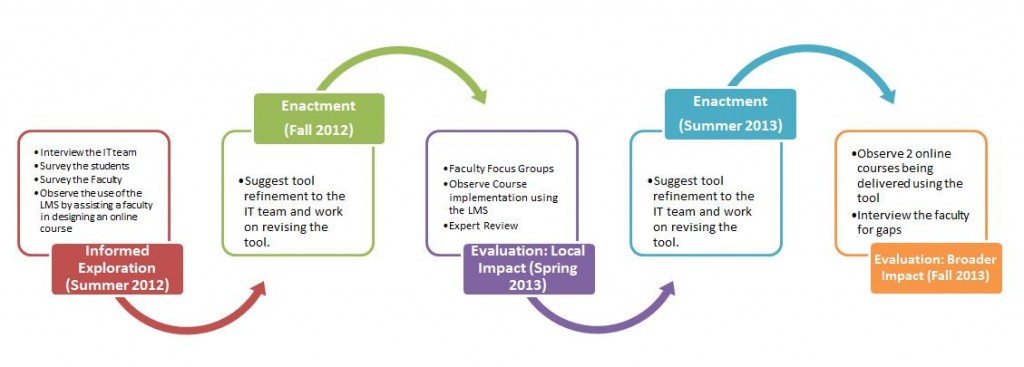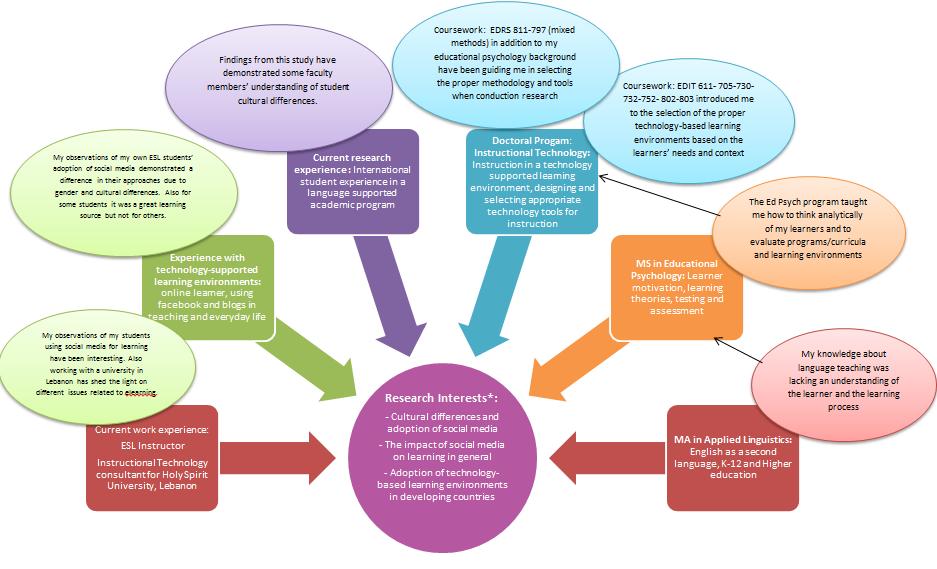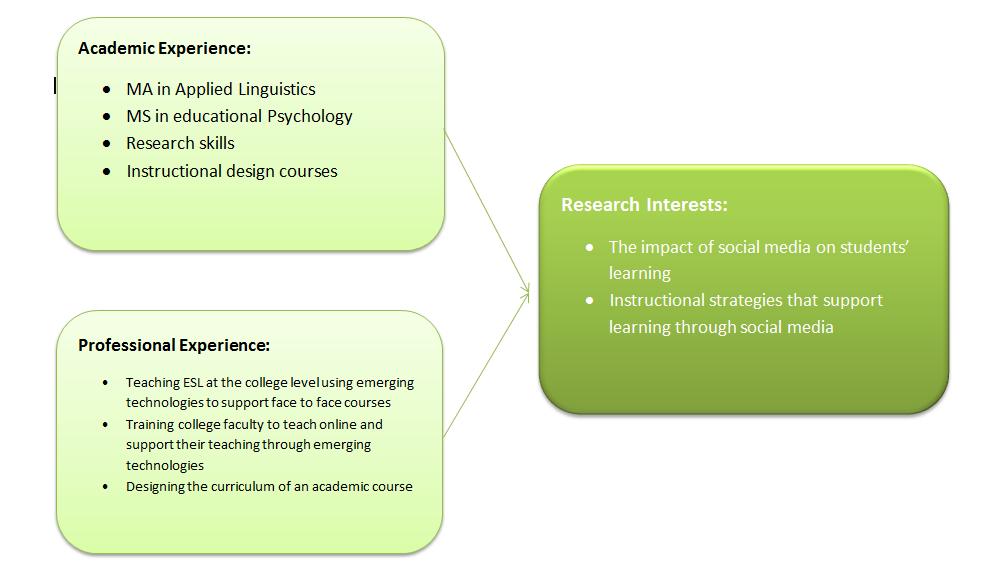Academic and IntegrativeThinking
Since the beginning of the PhD progam, I have been interested in elevating my teaching skills to meet the needs of a changing world of ever growing online learning environments that develop digital learners. I have been interested in  studying  how learners learn in an online environment and how they retain motivation in the absence of physical peer and teacher presence. I have also been interested in undestanding how language learners learn in a digital environment and how to select appropriate technology tools to support their learning. In addition to the two interests that I have had in the program, I am interested in studying learning environments and learners in developing and emerging countries hoping to provide support and assist them in the adoption of technology to support education.
To fulfill my research interests, my academic coursework has introduced me to the necessary research methods and to my own way of knowing that could support me in investigating what I am interested in learning about. It has also assisted me in understanding affordances of learning technologies, pedagogical theories underlying the design of technology supported learning environments (TSLEs), the design process of TSLEs, and online learning (tools, strategies, evaluation methods).
The research on constructivist learning, learning management systems, the online modules that I have created, design-based research, and the augmented-reality mobile game that I designed with my classmates have all contributed to my conceptual map of instructional design. The knowledge that I gained in these courses has influenced my teaching methods well; I am using more technology tools to support interaction and language learning in my courses. They have also been contributing to my teaching skills and to my research on online learning environments. Specifically, the knowledge I gained from the coursework has motivated me to conduct a pilot study in Spring 2011 to look at existing online learning environments in Lebanon.
Pilot Study- Spring 2011
In Spring 2011, I decided to conduct a pilot study to investigate the presence of online learning in higher education in Lebanon hoping to develop it into a dissertation. In Summer 2011, during my trip to Lebanon, I collected data from 3 private universities where I interviewed people from the provost office, from IT departments and assistant directors. Initial findings showed that only one of the four universities is aware of the real nature and process of online learning. There was no empirical data from the study, and it was mainly exploratory, but it raised other issues related to technology use in higher education in Lebanon such as adoption of a new method of course delivery and understanding the concept of online learning. However I found it to be impractical to take my research interest a step further due to long distance which will make it harder for me to follow up with the three universities over distance. I am still holding to this research interest which might be a possibility if I reside in Lebanon in the future. The pilot study resulted in a connection with one of the universities with which I am working to implement learning technologies to support teaching and learning.
HSRB Documents for pilot study: Human Subjects Application Form, Informed consent, Interview Protocol
After this pilot study, my interest was narrowed down into understanding the barriers and the drivers of the adoption of a new technology especially that the university in Lebanon was hoping to implement its in-house LMS that the IT department has developed. In Spring 2012, in EDIT 803, I conducted a literature review on exisiting LMSs and specifically their strengths and weaknesses. Due to the variety of LMSs, I looked at the two most popular LMSs, Moodle and Blackboard and studied their affordances which then resulted in a design-based research plan to evaluate the existing LMS at that university. The literature review has shed light on several affordances in any technology tool that could provide satisfaction for the end users. Mainly the aggregation of several features in one tool and the mobility of the tool were two major satisfaction attributes for adopting it. Lately, the university has decided to switch to Moodle instead of improving its existing LMS, and that’s when I had to stop thinking about improving their old LMS.
Design-based research plan to revise an exisiting LMS – EDIT 803
EDIT 803 helped me look at existing literature related to the affordances of online learning environments and understand from current research what makes students satisfied with a tool. This learning has transfered into my own teaching practices where I tried to use more mobile tools with them and more online interactive activities. More specifically, I have started using Blackboard more and other social media tools such as Facebook and Dropbox to communicate with the students and to establish a networked learning environment for them. This addition to my teaching practices has reminded me of  Lev Vygotsky who described human beings as social learners, but it also raised questions about the online world that we are living in and more specifically the learning strategies that make learners most effective in their learning process. In classes where I use social media, I feel knowledge is fluid and students are more at ease participating in class, and that arouse my interest in learning more about the types of tasks that faculty assign through social media (facebook, twitter, blogs, wikis, etc.) and how effective they are in promoting students’ learning.  To investigate these questions, I have decided to conduct a pilot study in Fall 2012 to look at exisiting practices of using social media by faculty at GMU.
The following conceptual map represents my educational background and work experience and how they have influenced my thinking.
Conceptual Map (word document)
After I designed the above conceptual map, I felt that it made sense only to me because it represents my scattered thoughts. I redesigned this conceptual map in a clearer way to represent my current thinking and what factors have influenced it.
Academic and Integrative thinking (continued)… Spring 2013
In the Fall, I conducted a pilot study to explore the use of social media in higher education and faculty and students’ perceptions about the effectiveness of these tools as used in higher education. This study which I describe in more detail in the dissertation planning section was a great start to explore my research interest and to guide me through the dissertation phase in two ways. First, I became more aware of how to design a study and select appropriate research questions.  Before I started conducting faculty interviews, I was confident about my research questions and about what I want to learn from the study. After I started reading more about the literature and listening to the participants in the interviews, I became shaky about what I already knew and what I wanted to know from this study. I noticed that my research study was looking at two different things, but I was halfway in the process, and I decided to keep going in the study and learn as much as I can so that it will be my pilot for future research.  A lesson that I learned for the future is to narrow down my research questions to one focused topic rather than several topics. Furthermore, I faced another difficulty while analyzing the learning activities that I collected from the faculty participants. I looked for several frameworks to analyze these frameworks, and then created my own simplified framework. I learned that that cannot be done in research sinc3e frameworks require validation. In the future, I have to look for a valid framework or validate my own.
This study has also introduced me to the literature about social media in education. Since I never took a course on social media, then it was interesting to examine what research was out there. I found interesting articles on the theory behind social media and its pedagogical use in higher education as well as paradigm shifts that are taking place in the instructional field. I also found several studies on the implementation and use of certain social media activities and their impact on students’ achievement. These articles and the study that I conducted contributed to my knowledge about social media and helped me refine my dissertation topic. I think this study helped me understand where my true research interest lie, which is in social media. My research interest ties back to my initial goal statement in which I indicated my interest in creating effective technology supported learning environments. Since social media is being highly used in higher education by students and faculty, then it would be worth studying its best practices.


